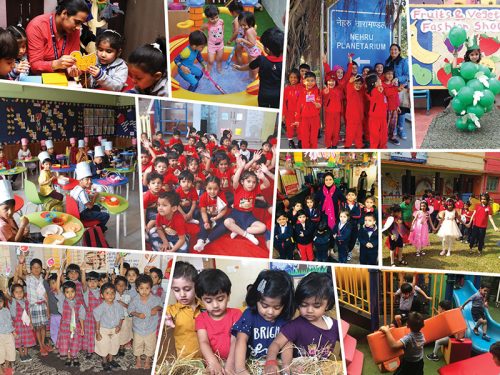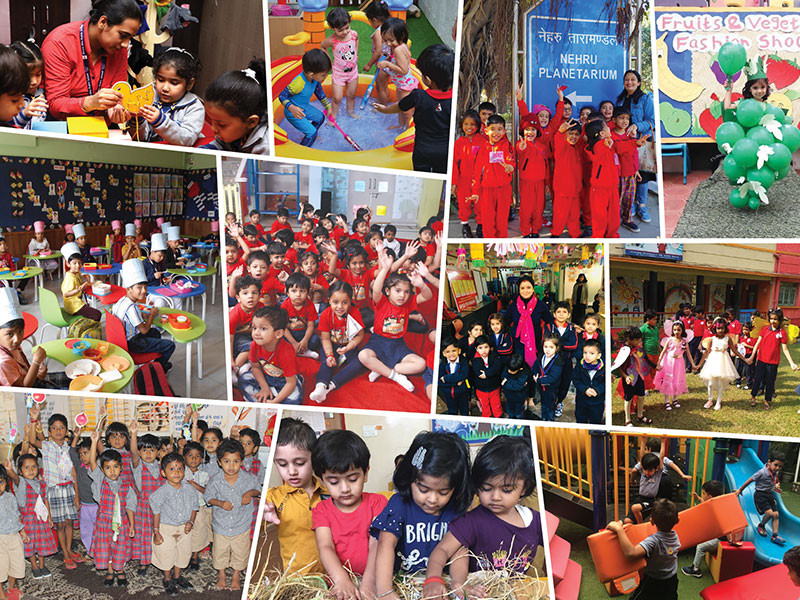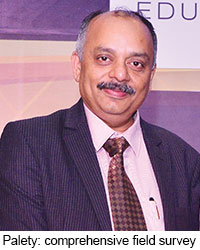No products in the cart.

EducationWorld India preschool rankings 2019-20
Against the backdrop of early childhood care and education about to be — even if belatedly — accorded high importance in the imminent National Education Policy 2019, the ninth consecutive EducationWorld India Preschool Rankings 2019-20 survey highlighting the country’s most admired pre-primaries and their best practices, assumes special importance – Dilip Thakore & Summiya Yasmeen

In the celebratory 20th anniversary issue of EducationWorld published last month, an unsparing internal jury awarded this mission-driven publication low social impact grades on several national objectives including our mission statement viz, “to build the pressure of public opinion to make education the #1 item on the national agenda”. On this prime objective EW was awarded a mere two stars (out of a maximum five). Similarly, on other affiliated objectives such as education liberalisation advocacy, propagating VET (vocational education & training), autonomy for higher education institutions, financial autonomy for private schools and defending private budget schools etc (see https://www.educationworld.in/ew-impact-assessment/), we received modest ratings.
However, the rating awarded for sustained advocacy of professionally administered early childhood care and education (ECCE), was a higher three stars. Perhaps a four-star rating equivalent to the score awarded for popularising credible preschool, school and private university rankings would have been more appropriate. Because since 2007 when your editors belatedly experienced an epiphany about the critical importance of ECCE in the cognitive development of children following US-based economist Dr. James Heckman’s research indicating that a dollar invested in ECCE saves $16 in the education continuum to university — for which he was co-awarded the Nobel economics prize in 2000 — EducationWorld has been in the vanguard of a growing national movement for provision of high-quality ECCE to all children in the 0-6 age group.
Since then, EducationWorld has relentlessly promoted universalisation of professionally administered ECCE for youngest children, whose physical and mental well-being is of paramount importance for the emergence of this country as a global force in the 21st century. Consequently, we have also been ardent supporters of the Mumbai-based Early Childhood Association (ECA, estb.2010), a preschools affiliating organisation which prescribes minimum standards and best ECCE practices to member and socially disadvantaged preschools. Simultaneously, we have been exerting continuous pressure on government to upgrade and professionalise the country’s 1.36 million Central government-promoted anganwadis which also receive state government support by way of wages and salaries.
Promoted in 1976, anganwadis are essentially nutrition centres for lactating mothers and infants which are also mandated to provide ECCE to pre-primary children. However it’s noteworthy that the 1.36 million anganwadis accommodate only 50 percent of the country’s 165 million children in the 0-6 age group. Moreover, government anganwadis are severely under-funded and under-staffed with a per child allocation of a mere Rs.2,361 per year. In a detailed calculus sent by your editors to the PMO (prime minister’s office) and the Union HRD ministry after presentation of the Union budget to Parliament and the people, for the past several years, we have been forwarding a schema for mobilising a sum of Rs.6.37 lakh crore for investment in education. In this calculus (never acknowledged by the HRD ministry or eminent economists invited to critique it), we have provisioned a sum of Rs.110,000 crore for upgrading anganwadis and expanding publicly provided ECCE.
Moreover, in 2010, EducationWorld commissioned the Centre for Forecasting & Research Pvt. Ltd (C fore, estb.2000), a highly reputed Delhi-based market research and opinion polls company to conduct the first-ever preschools field survey to rate and rank sufficiently well-known preschools in urban India (ECCE is unknown in rural India) on ten carefully selected parameters of ECCE excellence. They include teacher competence, infrastructure, individual attention to pupils, value for money, leadership, innovative teaching, safety and hygiene etc.
Since then, the annual EducationWorld India Preschool Rankings (EWIPR) surveys have been regularly conducted by C fore and have not only impacted the critical importance of the hitherto neglected subject of ECCE on the public consciousness, but have also aroused great enthusiasm within the marginalised community of early childhood education providers. Cognisant of the reality that sufficiently well-known preschools in urban India are ‘elite’ fees-levying private institutions, in recent years the annual EWIPR surveys have also begun rating and ranking the best anganwadis in major cities, to give a boost to government-run preschools wholly ignored by the middle and upper classes.
Publication of the annual EWIPR league tables rating preschools in major cities on ten parameters of preschool education excellence and ranking them inter se is followed up by the annual EducationWorld National Early Childhood Education Conference at which top-ranked pre-primaries are felicitated and awarded trophies and certification. This annual conference is also addressed by eminent ECCE experts from India and abroad who discuss and debate best practices in early childhood education. Your editors’ relentless advocacy of the fundamental importance of ECCE for over a decade has had the beneficial impact of encouraging and enthusing the hitherto neglected community of early childhood education providers.
“The impact of EducationWorld is huge, mammoth and massive. Over the past 20 years if any positive changes have happened in education, it’s because EW has raised them editorially, debated them in conferences and constantly badgered the government and education stakeholders. Also, on behalf of the Early Childhood Association, I’d like to thank EducationWorld for leveraging our work, at a time when we were struggling to be heard and seen,” said Dr. Swati Popat Vats, president of over 3,000-strong chain of the Mumbai-based Podar Jumbo Kids preschools across the country, and founder-president of the Early Childhood Association of India (ECA, estb.2010), in an impact assessment message to EducationWorld on its 20th anniversary (EW November).
Even more encouraging, India’s ivory tower academy and the establishment which were hitherto blissfully unaware of the value and importance of ECCE, have also experienced a belated epiphany. The draft National Education Policy 2019 report of the nine-member K. Kasturirangan Committee submitted to the Union HRD ministry last summer which is now reportedly being finalised, cites (inevitably without attribution) the argument continuously advanced by EducationWorld for the past decade that children’s brains are 85 percent developed by age six. Therefore, if infants are provided quality ECCE, they would be fully prepared to derive maximum advantage of school and higher education.
The weightage accorded to ECCE by the KR Committee is evidenced by its making the case for professionally administered early childhood education and care over nine pages in its report. Moreover, the NEP draft makes a novel and welcome proposal to extend ECCE to class III children in primary school with the recommendation that this “pedagogical unit” should be described as “foundational stage” education, arguing that currently children in preschools and classes I and II are “not receiving developmentally appropriate education suited to their needs”. “It is only about age 8 that children adapt to more prescripted learning,” says the KR Committee’s report. This innovative suggestion of the committee is almost certain to be incorporated in the final NEP 2019.
Against this backdrop of early childhood care and education about to be — even if belatedly — accorded high importance in the imminent National Education Policy 2019, the ninth consecutive EducationWorld India Preschool Rankings 2019-20 survey highlighting the country’s most admired pre-primaries and their best practices, assumes special importance. It’s a primer for less professionally managed preschools, especially the government’s 1.36 million anganwadis, to adopt tried and tested best ECCE practices that will enable children in the vulnerable 0-6 age group to begin the process of learning joyfully.
“The ninth perceptual survey of India’s best preschools was conducted in 16 cities — Delhi, Mumbai, Chennai, Kolkata, Bangalore, Hyderabad, Pune, Ahmedabad, Gurgaon, Noida, Bhubaneswar, Chandigarh, Ghaziabad, Bhopal, Jaipur and Kochi. Over 100 C fore field researchers interviewed a total of 8,497 SEC (socio-economic category) ‘A’ parents with at least one child in preschool, and teachers and principals in pre-primary education. Every respondent was shown a list of most well-known preschools in their city and was requested to rate preschools they were aware of on a ten-point scale under ten parameters of early childhood excellence. The parameters were competence of faculty,  infrastructure, individual attention to students, value for money, leadership/management quality, safety and hygiene and special needs facilities, among others. Preschools assessed by less than 30 persons have not been ranked. The rating points awarded by respondents under each of the ten parameters were multiplied by ten and totalled to rank preschools in the 16 selected cities. All the parameters were given equal weightage except ‘competence of teachers’ which was given double weightage,” says Premchand Palety, founder-CEO of the Delhi-based Centre for Forecasting & Research Pvt. Ltd (C fore, estb.2000) which conducted the extensive field survey for EWIPR 2019-20.
infrastructure, individual attention to students, value for money, leadership/management quality, safety and hygiene and special needs facilities, among others. Preschools assessed by less than 30 persons have not been ranked. The rating points awarded by respondents under each of the ten parameters were multiplied by ten and totalled to rank preschools in the 16 selected cities. All the parameters were given equal weightage except ‘competence of teachers’ which was given double weightage,” says Premchand Palety, founder-CEO of the Delhi-based Centre for Forecasting & Research Pvt. Ltd (C fore, estb.2000) which conducted the extensive field survey for EWIPR 2019-20.
An alumnus of the Punjab Engineering College and Fore School of Management, Delhi, Palety learned the ropes of market research in the Operations Research Group, India’s pioneer retail markets research company, where he served for over a decade prior to promoting C fore. Among C fore’s clients are Hindustan Times, Nestle, Mint and the Congress party.
In the pages following, we present league tables of India’s best preschools rated on ten parameters of pre-primary education excellence and their ranking in 16 cities. Moreover, the Top 5 anganwadis in Delhi, Mumbai and Bangalore are also ranked by specially selected SEC (socio-economic category) ‘C’, ‘D’ and ‘E’ respondents.
With Paromita Sengupta, Shraddha Goled (Bangalore) & Baishali Mukherjee (Kolkata)
Also read:
Delhi’s top-ranked preschools 2019-20
Noida’s best preschools 2019-20
Gurgaon’s most admired preschools 2019-20
Ahmedabad’s best preschools 2019-20
Pune’s best preschools 2019-20
Hyderabad’s most admired preschools 2019-2020
Bangalore’s best preschools 2019-20
Chennai’s best preschools 2019-20















Add comment